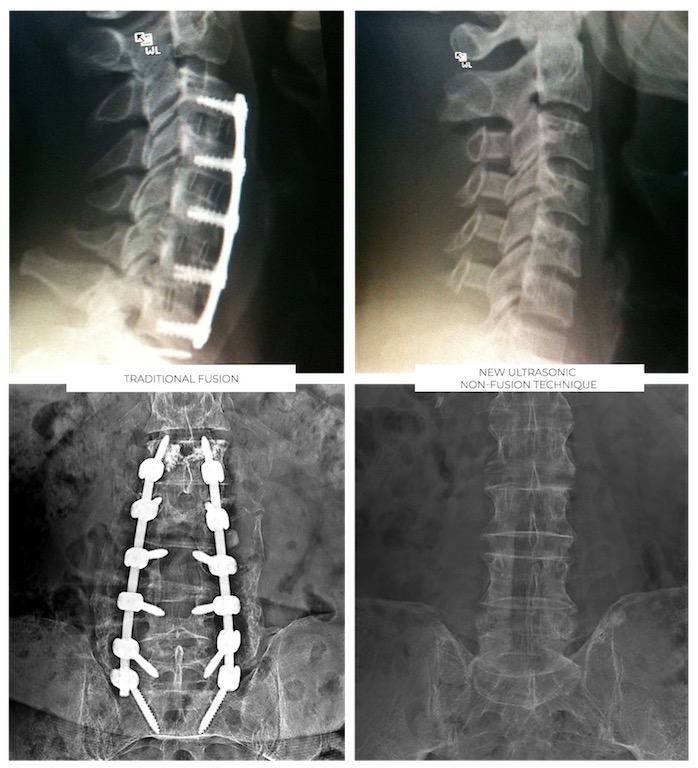 Photo Credit: James Argyropoulos
Photo Credit: James Argyropoulos
CANTOR SPINE INSTITUTE IS REVOLUTIONIZING SPINAL CARE THROUGH “ULTRASONIC” MINIMALLY INVASIVE PROCEDURES
Dr. Jeffrey Cantor at the Cantor Spine Institute, located in Fort Lauderdale, Florida, is pioneering an entirely new approach to spine surgery. Using new ultrasonic technology, individuals with spinal conditions such as cervical spinal stenosis, lumbar spinal stenosis, spondylolisthesis, disc herniations, and more complex spinal conditions can now avoid spinal fusions.
Until recently, patients have been limited to traditional and dated spine surgery methods that utilize sharp, “Dremel” saw-like cutting tools to relieve painful pressure from the spinal nerves. Lacking in precision, blades spinning at high speeds cannot safely work in confined spaces without necessitating the removal of large amounts of bone and important structures, a process called laminectomy. These important structures that hold us upright and keep us active and mobile are subsequently replaced with rods, screws, and fusions. The result can be unnecessary loss of mobility, function, and lifestyle. The stiffness of fusions also creates abnormal stresses above and below the fused area, leading to increased rates of wear. Pain often returns resulting in the need for additional surgery.
Photo Credit: James ArgyropoulosAccording to Dr. Cantor, “The process of doing a surgery to fix a problem that can potentially create a bigger problem has to be re-thought.”
Now, taking advantage of new and novel technology, Dr. Cantor offers his patients motion-preserving, function-sparing, and lifestyle-preserving spinal surgery. The “Bone Scalpel” is an ultrasonic bone cutter with a dull blade that vibrates back-and-forth at an extremely high frequency (22,500 oscillations per second) to essentially dissolve bone. Since the blades are not sharp and do not spin or tear, they can be safely used in confined spaces. This technology is redefining “minimally invasive” spinal surgery.
The ultrasonic Bone Scalpel has facilitated advances that were previously not possible or safe. After almost 30 years of clinical practice and close to 10,000 spinal surgery procedures, ultrasonic technology has completely changed and improved Dr. Cantor’s process and practice. It has enabled him to design new surgical techniques that are much less invasive than traditional surgery and can actually do much of what laser surgery promised but failed to deliver.
Using techniques that Dr. Cantor has developed, the Bone Scalpel enables him to isolate and essentially dissolve the painful bone spurs that “pinch” nerves. It is a precision sculpting tool that enables bone cutting in a tiny space, and it can be used safely, even in direct contact with nerves. This instrument allows access to work inside the spinal canal with less compromise of native anatomy. Traditional laminectomy is no longer necessary. The normal, necessary, structures that hold us up, keep us active, and mobile can be preserved.
“If you don’t remove the important structures of the spine, you don’t have to rebuild them with fusions and rods and screws,” says Dr. Cantor.
Using these new techniques and technologies, Dr. Cantor has been able to dramatically reduce the magnitude of spinal surgeries. This process has resulted in many measurable advantages:
- Preservation of mobility
- Preservation of function
- Improved surgical outcomes
- Improved patient satisfaction scores
- Reduced overall complications
- Reduced surgical pain
- Dramatic reduction in narcotic needs after surgery
- Reduced blood loss negating the need for blood transfusions and blood banking
- Shorter hospital stays
- Faster recovery and healing time
- Reduced need for additional surgery
- Fewer wound infections
- Reduced anesthesia and surgical time

Dr. Cantor’s founding vision for Cantor Spine Institute is to deliver lifestyle-preserving, long-lasting, superior solutions for patients with spine problems. His pioneering of nondestructive processes, techniques, and procedures are the result of exhaustive research, painstaking outcome analysis, incessant practice, and a positive embrace of the benefits of new technology.
The commitment at Cantor Spine Institute is to provide our patients with the safest, transformative, individualized treatment plans that harness the latest technology and innovations to preserve, restore, and better the spine.
It is very important to note that in certain cases such as scoliosis, spinal deformity, revision surgery, and other specific situations, spinal fusions are necessary and useful. However, they should be avoided whenever possible, and these new techniques facilitate that process.
To learn more about Cantor Spine Institute’s revolutionary patient care visit www.CantorSpine.com.
For more information, visit Dr. Brian A. Levine's social media:

























